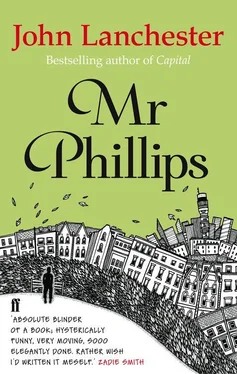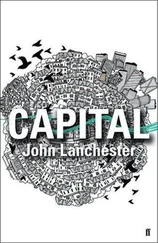first 5 years 6 hrs 37.5 % of waking time next 12 years 1 hr 6.25 % next 3 years 4 hrs 25 % next 5 years 1 hr 6.25 % next 14 years 15 min at home + 1.45 hrs at work = 2 hrs = 12.5 % next 11 years 4 hrs 25 %
This works out as a weighted average of 16.375 per cent, or 2.62 hours, or 2 hours and 37 minutes of, broadly speaking, free or nothing time. It is a lot of blank space to account for in one life span. Now that he is redundant he is going to have even more of it; in fact, he can have all day every day, unless and until he finds something else to do. The thought of this is an immense strain. It must be why so many men died after their retirement.
Two of the many foreign coach drivers parked across the road from the Tate are having an argument in a language Mr Phillips does not recognize. They are standing on the road-ward side of their huge two-decker vehicles. The shorter and by a fine margin angrier of the two is pointing repeatedly at the other’s coach, then at himself, then downwards at the road, while the other man energetically shakes his head and keeps loudly repeating the same word.
Mr Phillips presses on up the road, past the nasty modern building where the Labour Party has its headquarters, into which a dispatch rider has just stridden, past the dwarfing, monolithic government buildings along the Embankment. Further along the road he can see the beginnings of Westminster, all grand and Gothic and trying to look a million years old. If banks try to look all secure and posh and safe and stable and big and respectable and stuffy and built to last for all time, for the simple reason that at heart they are just casinos, what is it that these government buildings were concealing? Probably that they tried to make people feel small, so that the actions of the people in these buildings will seem far beyond their understanding, impersonal and authoritative and independent of anything so trivial as the consent of the governed. It is like Peter Pan only backwards: if we all clapped our hands then the whole edifice of government could be made to go away, to fade like night terrors remembered in sunshine.
As Mr Phillips nears the Houses of Parliament he sees a nice little park across the road. For a moment he wonders if this is where politicians are always being interviewed for the telly, then he realizes it isn’t.
‘Girl your booty is so round, let me look you up and down,’ sings Martin.
He and Mr Phillips are sitting in a very big and noisy restaurant just around the corner from Martin’s office in Soho. They are both holding menus which they have not yet opened. The room has bare white walls and one entire window is open to the street, so that the diners’ conversation has to compete with the traffic as well as with the coming and going of waiters and the general restaurant hullabaloo. Martin is holding a lit cigarette in his left hand.
‘What’s that one called?’ asks Mr Phillips.
‘That’s the one that gave me the idea,’ explains Martin. ‘It’s called Boom Boom Boom by the Outhere Brothers.’
‘Is a booty the same thing as a bottom?’ asks Mr Phillips. But his son does not dignify the question with a reply.
‘You’d better look at the menu,’ says Martin. ‘I’ve got to be back in the office by a quarter past two.’
Mr Phillips has not heard of many of the things on the printed and dated list in front of him. What is lomu and why does it cost £6.95? What is or are couscous, teriyaki, carciofini and bok choy? He could ask Martin, but Martin — although he had seemed pleased enough at his father’s unannounced and entirely unexpected lunchtime drop-in — does not now seem in all that good a mood. Mr Phillips settles for grilled scallops with bacon followed by a fish cake.
A waitress wearing black Doc Marten boots, a very short black skirt and a white shirt with two buttons undone comes to their table. Martin says:
‘Is it my imagination, Sophie, or are you looking even more beautiful than usual today?’
‘What’ll it be, Mr Phillips?’ says Sophie, blushing only very faintly.
‘Martin,’ says Martin. ‘This is the real Mr Phillips. Sophie — meet my father. Dad — meet Sophie.’
‘Hello,’ they both say.
‘What would you like to eat, Mr Phillips?’ Sophie says, this time to Mr Phillips. He gives her his order. She turns swiftly, without speaking, to Martin.
‘Well, you know what I want, Sophie,’ he says, ‘but what I’ll eat is the pumpkin ravioli followed by the sea bass. I’ll have fizzy water and Dad’ll have — gin and tonic?’
‘Yes please,’ says Mr Phillips. Sophie goes away after volunteering to put ice and lemon in both drinks. Martin sits back happily.
‘Tell me about the new record you’re doing,’ says Mr Phillips. Martin runs his own company. They buy up rights to songs and assemble compilation records based on themes and periods in pop music.
‘We haven’t decided on the title yet. Something like Boys on Girls , only probably not quite that. The idea is men’s songs about women from a politically incorrect point of view. No love songs, just tracks about being randy and fancying girls. “Titties and Beer” — that’s a Frank Zappa song — only it’s too complicated musically. I mean, musically, it’s the sort of thing Mum would approve of.’
‘Well, we can’t have that,’ says Mr Phillips.
‘“Get out of my dream and into my car”,’ says Martin. ‘“Smack my bitch up”.’ Then, seeing his father’s expression, he explains, ‘It’s ironic.’
‘Ah,’ says Mr Phillips.
The restaurant is by now completely full. At Wilkins and Co., Mr Phillips normally ate lunch either in the staff canteen or at his desk, dividing his custom between the two most closely adjacent sandwich bars, both of them run by friendly Italians. This had however become a source of ethical friction, since the nearer (and humanly nicer, by a narrow margin) shop had recently begun to fall away in the quality of its sandwich making — a slightly pongy prawn cocktail sauce one day, a soggy ham bap on a subsequent visit. It was a problem. Should Mr Phillips a. say something, b. switch his custom to the other shop, c. give up eating sandwiches altogether, d. carry on spending money there as usual for old times’ sake and out of embarrassment and an inability to walk past the shop to its neighbour and competitor on every single sandwich-eating day? He was too shy for a., not ruthless enough for b., already fat enough for the c. option of eating only canteen food to be a bad idea. But if he did opt for d. out of weakness and sympathy, perhaps he was undermining the efficiency of the free market and damaging the sandwich shop even further, causing them to end up losing more customers because they hadn’t been alerted sufficiently early to their budding quality control problems? He would be gumming up the works, making things worse by trying to be nice, like those people who won’t take their change from prices which end in 99p, and so unwittingly and well-meaningly contribute to inflation, the cancer of modern economic life, the eroder of savings, destroyer of industry, scourge of the middle class, the force that brought Hitler to power. Or at least that was what he had been taught by the most right-wing of his economics lecturers.
Being sacked had at least solved that dilemma for him.
This restaurant is really something. Mr Phillips has never seen anything like it. Every single customer in the place seems to be talking or shouting as loudly as possible, except for the waiters who are rushing about at dangerous speed, and who seem especially to enjoy the bit where they swivel and bang backwards through the kitchen doors holding their trays stylishly high.
The drinks arrive, Sophie the waitress moving out of flirtation range with polite rapidity.
Читать дальше




![Unknown - [Carly Phillips] The Bachelor (The Chandler Brothe(Bookos.org) (1)](/books/174132/unknown-carly-phillips-the-bachelor-the-chandle-thumb.webp)







